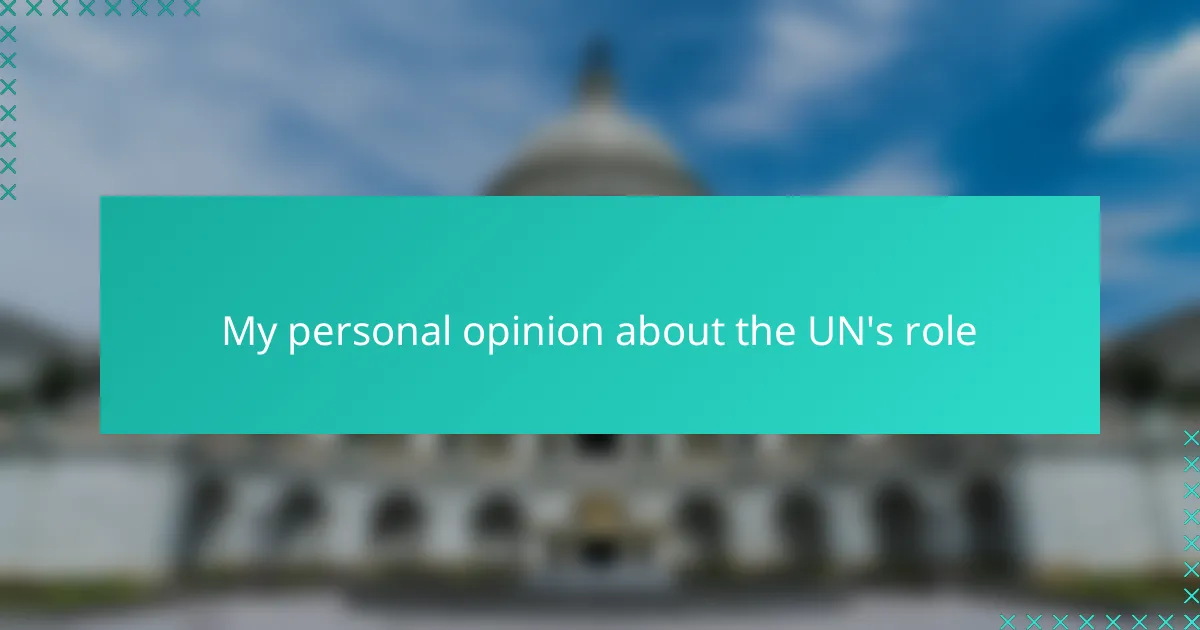Key takeaways
- The United Nations plays a multifaceted role in fostering international cooperation, encompassing peacekeeping, humanitarian aid, and setting global norms.
- Challenges such as political divisions among member states, the complexity of modern conflicts, and resource limitations hinder the UN’s effectiveness.
- The UN serves as a vital platform for dialogue, helping to prevent misunderstandings and conflicts between nations despite political realities often limiting its influence.
- Evaluating the UN’s effectiveness highlights the importance of member states’ cooperation and the necessity for adaptability in addressing contemporary global challenges.
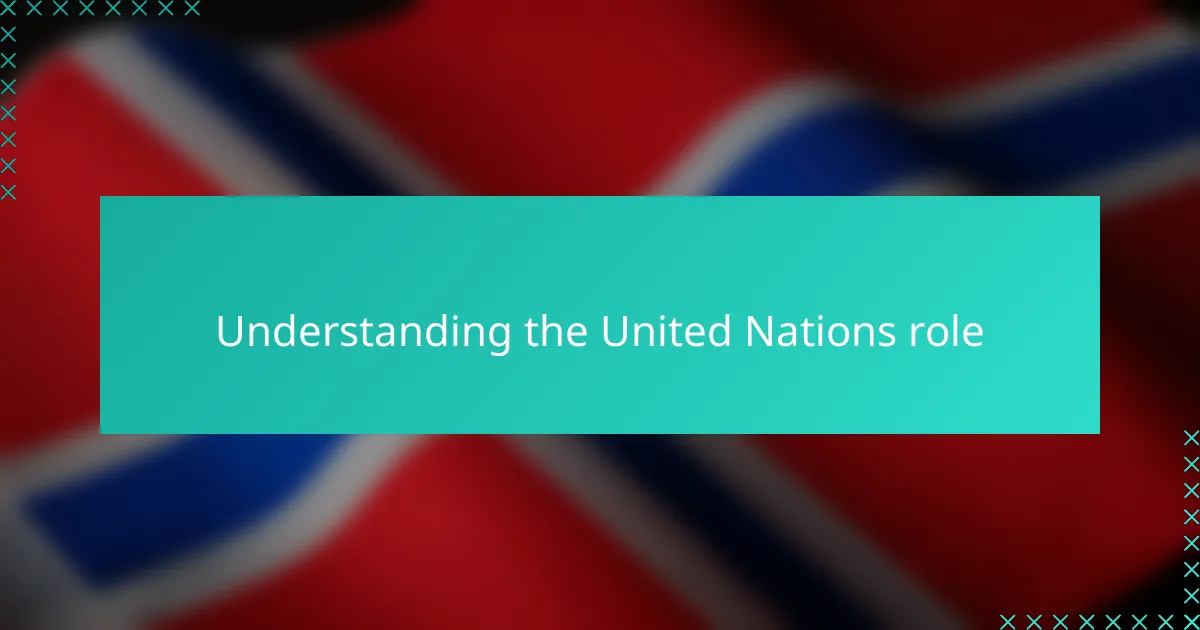
Understanding the United Nations role
When I first tried to grasp the full scope of the United Nations’ role, I was struck by how vast and varied it truly is. It’s not just about peacekeeping missions, but also about fostering international cooperation on everything from human rights to climate change. Have you ever wondered how one organization can juggle such diverse responsibilities?
What’s fascinating to me is that the UN acts as a global platform where countries, big and small, have a voice. This inclusivity sometimes gets overshadowed by political gridlock, but it reminds me that diplomacy is often a slow and delicate process rather than a quick fix. I’ve seen firsthand how meaningful dialogue can be when even the smallest nation’s concerns are acknowledged.
At its core, the UN symbolizes a collective hope for a more peaceful world, but it also exposes the complex realities of global politics. Do you think it’s fair to expect a single institution to resolve conflicts born from centuries of history and cultural differences? In my experience, understanding the UN’s role requires patience—and a recognition of both its achievements and limitations.
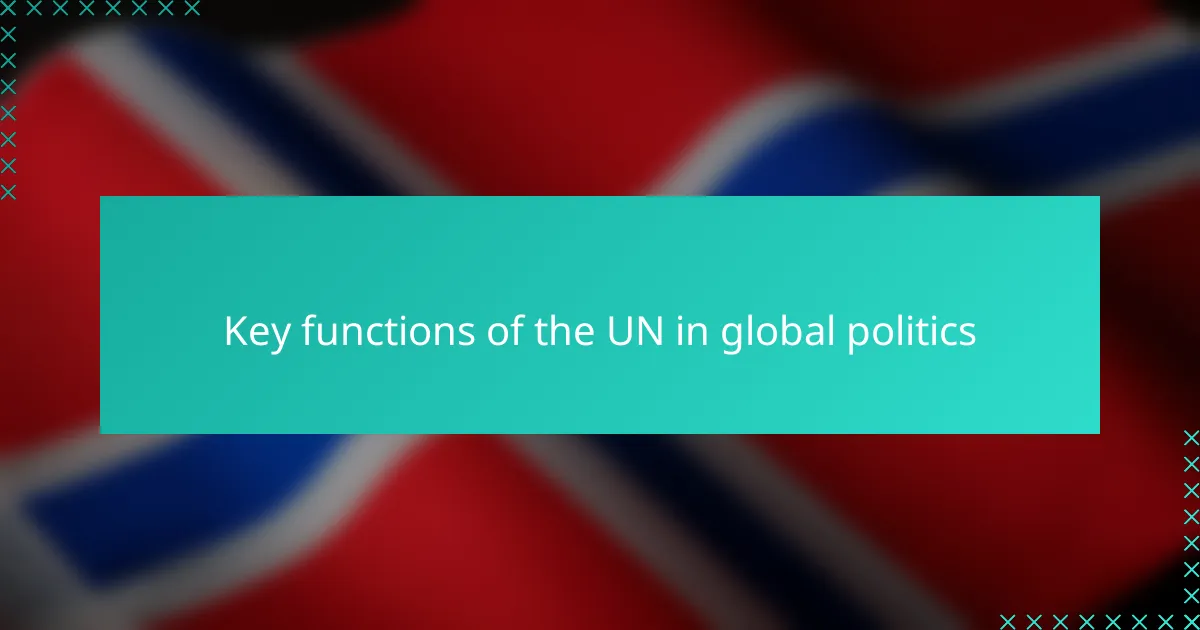
Key functions of the UN in global politics
One key function of the UN that I find essential is its role in peacekeeping. Watching headlines about UN missions often made me wonder: How does this organization keep peace between nations with such deep-rooted conflicts? From what I’ve learned, peacekeeping operations are not just about sending troops; they’re delicate efforts to build trust and stability, which can take years.
Another function that struck me is the UN’s commitment to humanitarian aid. I remember reading about their work during crises, and it made me realize how crucial their coordination is in delivering life-saving assistance. It’s more than just logistics—it’s a lifeline for millions caught in emergencies beyond their control.
Lastly, the UN serves as a hub for setting international norms, like human rights standards. I often ask myself, how effective can these agreements be when enforcement depends on member states’ willingness? Still, this framework creates common ground and shared expectations, which is vital in an unpredictable world.
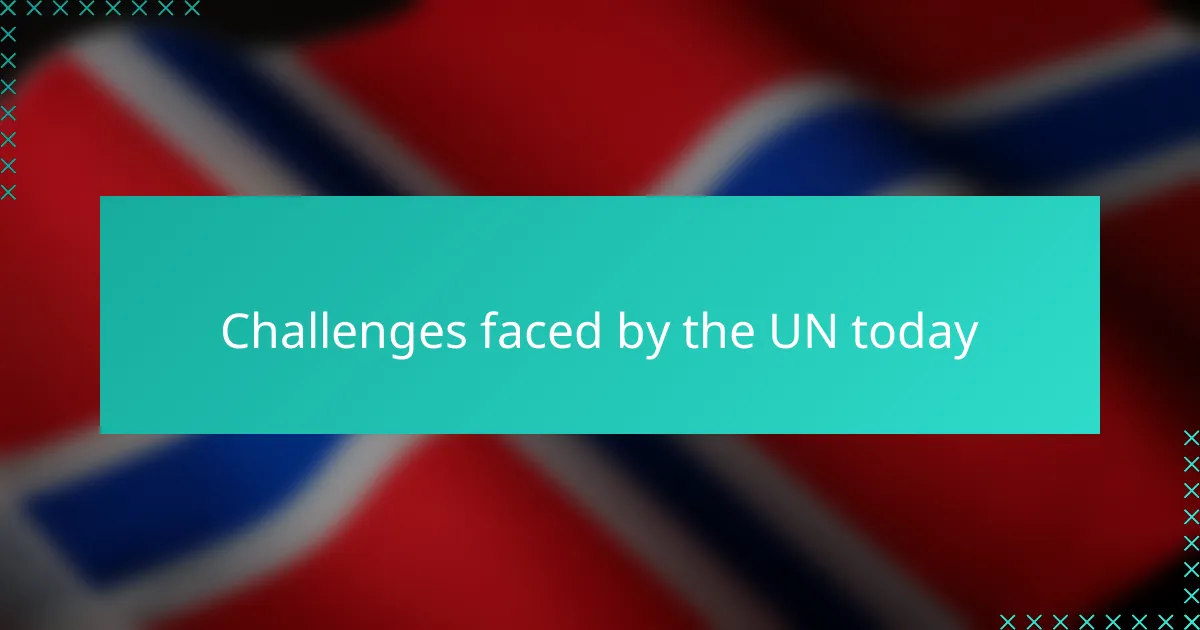
Challenges faced by the UN today
One of the biggest hurdles the UN faces today, in my view, is dealing with political divisions among its members. I can’t help but wonder how effective the organization can be when powerful countries block resolutions for their own interests. It’s frustrating, because these disagreements often stall urgent actions in crises where delays can cost lives.
Another challenge that stands out to me is the sheer complexity of modern conflicts. Unlike traditional warfare, many conflicts now involve non-state actors and are deeply intertwined with issues like terrorism and cyber threats. I’ve thought a lot about how the UN’s existing structures sometimes struggle to keep pace with these evolving threats, making peacekeeping even more complicated.
Finally, funding and resource limitations seem to be an ongoing struggle. From what I’ve seen, the UN depends heavily on member contributions that aren’t always reliable or sufficient. It makes me ask: how can the UN fulfill its ambitious missions when it’s constantly battling budget shortfalls and logistical constraints? This gap often restricts the organization’s ability to respond swiftly and comprehensively.
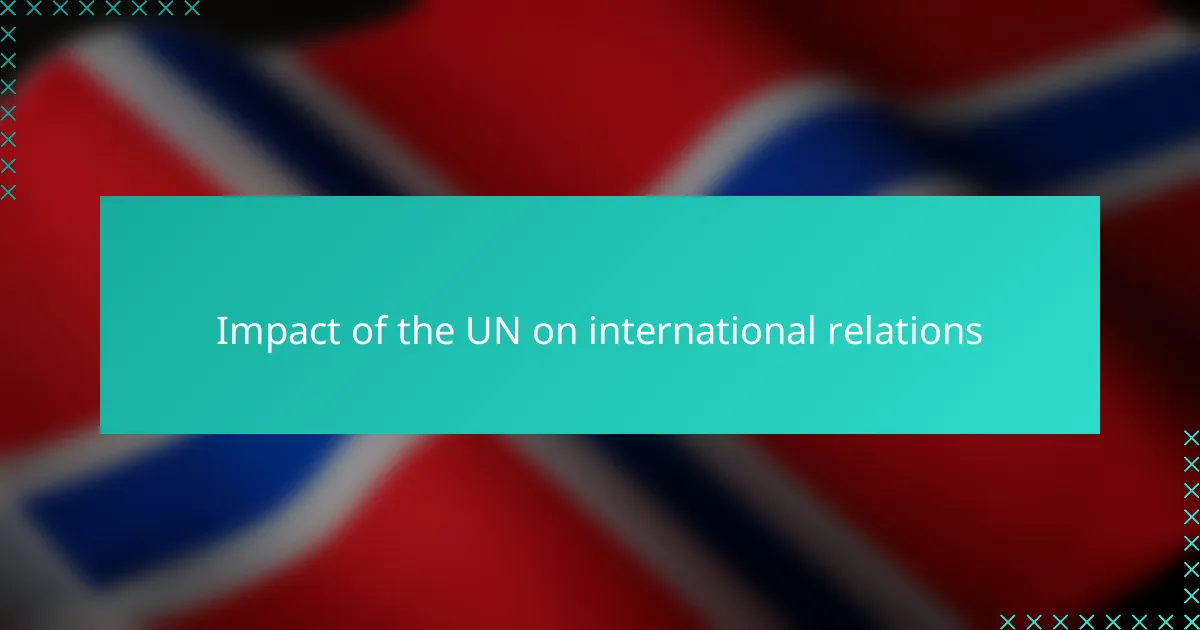
Impact of the UN on international relations
When I consider the impact of the UN on international relations, I’m often reminded of how it creates a structured space for dialogue among diverse nations. It’s remarkable how often this platform prevents misunderstandings from escalating into conflicts—even if the progress can feel slow. Have you noticed how just having a channel where leaders can speak openly sometimes diffuses tension before it boils over?
From my perspective, the UN’s role in setting norms and standards is another profound way it shapes relations between states. These shared expectations, while sometimes unenforceable, act like invisible threads weaving countries together in a common framework. I often think about how this foundation of agreed principles fosters trust in a world where suspicion could easily dominate.
Still, I can’t overlook how the UN’s influence is sometimes limited by political realities. When powerful members prioritize national interests over collective goals, the system struggles to maintain cohesion. It makes me wonder: is the UN’s greatest strength also its greatest weakness, relying fiercely on cooperation while often grappling with competing agendas?
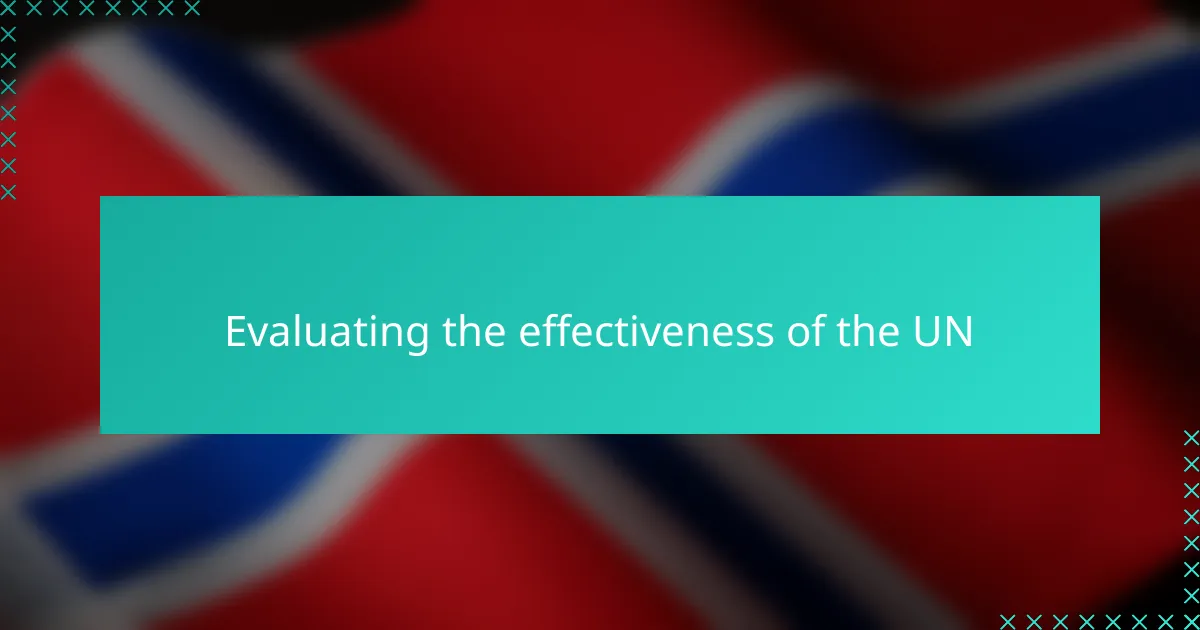
Evaluating the effectiveness of the UN
Evaluating the effectiveness of the UN is a complex task, and I often find myself torn between admiration and frustration. On the one hand, the UN has undeniably contributed to reducing conflicts and providing humanitarian aid, but on the other, its impact sometimes feels muted by political deadlock. Have you ever considered that the very qualities aimed at inclusivity and consensus can become obstacles when urgent action is needed?
From my perspective, the UN’s successes largely depend on the willingness of its member states to cooperate, which isn’t always guaranteed. I remember reading about peacekeeping missions that made tangible differences on the ground, yet I also came across countless examples where efforts stalled due to lack of political will or funding. It begs the question: Can any international organization be truly effective when it must navigate such diverse, and often conflicting, national interests?
Lastly, evaluating effectiveness also means acknowledging the unique challenges the UN faces in adapting to new global threats. I’ve thought a lot about how traditional mechanisms struggle with emerging issues like cyber warfare and terrorism. Is it fair to expect an institution born in the 20th century to instantly evolve and tackle 21st-century complexities? In many ways, the UN’s effectiveness is not just a reflection of what it achieves, but also of how it adapts to an ever-changing world.
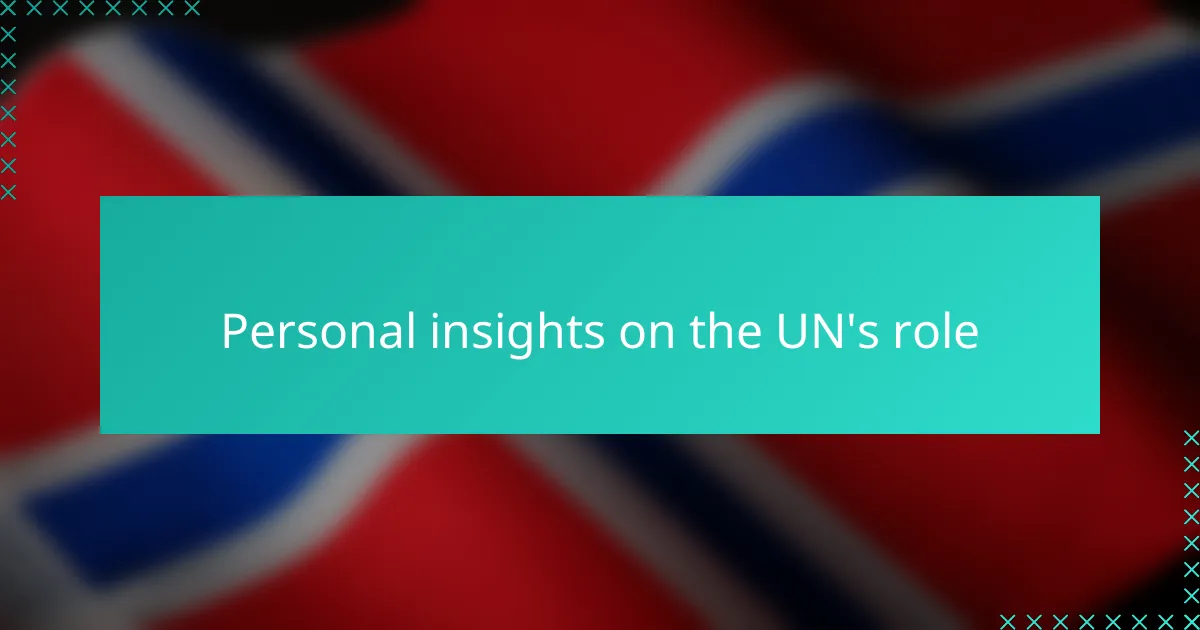
Personal insights on the UN’s role
I’ve often reflected on how the UN, despite its flaws, represents a unique experiment in collective global governance. It’s impressive how it brings together countries with vastly different histories and interests, striving for common goals. Yet, I sometimes wonder: can such a diverse body truly move beyond its internal divisions to act decisively when it matters most?
From my experience, the UN’s role is as much about symbolizing hope as it is about practical results. I recall moments when UN-led initiatives sparked small but meaningful changes on the ground—proof that even incremental progress can inspire optimism. Still, I can’t help but feel that this hope often meets the harsh reality of political inertia and competing agendas.
What strikes me most is how personal the UN’s impact can be when you hear stories from those affected by its work. Whether it’s a refugee finding safety or a community rebuilding after conflict, these human elements remind me why the UN’s mission remains vital. It makes me ask: despite all its challenges, how can we not support an institution that, at its core, aims to uplift humanity?
